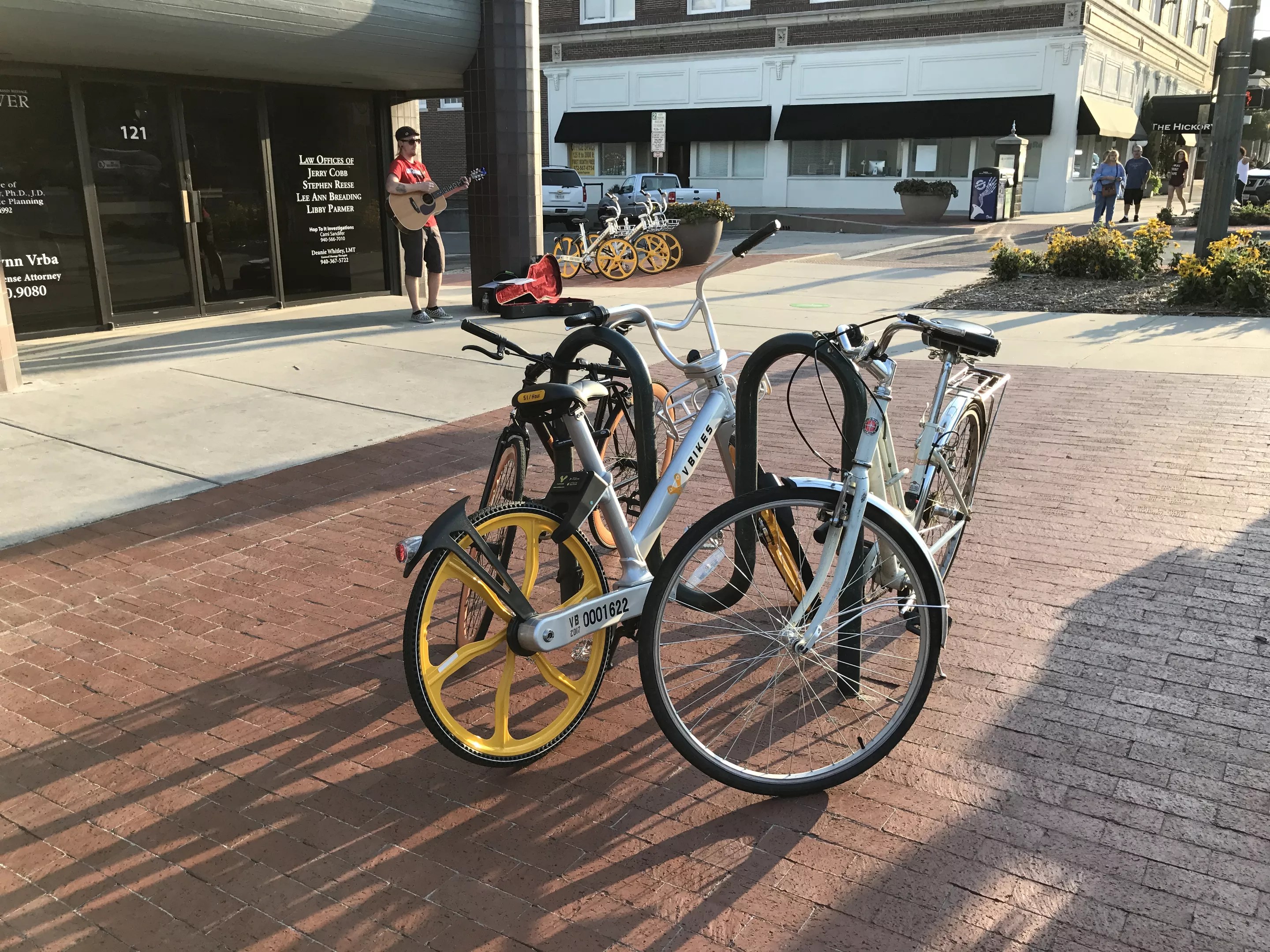
Sarah Schumacher

Audio By Carbonatix
As of this summer, slick, modern, slate and yellow bicycles have begun to dot Denton, Dallas and Irving. VBikes is an app-based, station-free bike-sharing service based in Garland, and the startup has ambitions of expanding beyond North Texas.
Think of VBikes as two-wheeled versions of Zip Cars. To use a bike, an app user simply waves a phone over a bike’s smart lock and pays one dollar per hour, with a limit of 10 hours per day. The assumption is that you have a smartphone.
While VBikes is the buzziest company to take a stab at bike sharing in Dallas, it’s not the first. The city of Dallas tried to initiate a program in Fair Park in November of 2014. It flopped.
But nobody really wanted to ride around just Fair Park. The bikes had to be returned to the station at the park, meaning riders had to stay within the area, and at a rate of $5 for the first 30 minutes and $2.50 per hour after, Dallasites could not be bothered to leave behind their more comfortable four-wheeled transports in favor of the city’s blue bikes.
This year, make your gift count –
Invest in local news that matters.
Our work is funded by readers like you who make voluntary gifts because they value our work and want to see it continue. Make a contribution today to help us reach our $30,000 goal!
This is the gap VBikes jumped into. By employing smart locks, an app and GPS tracking, VBikes has freed itself from the bounds of pesky bike stations. Riders can find a VBike anywhere, disengage the lock with the app and a cellphone, and leave the bike at their destination, making it a far more convenient method of transportation for the bipedal masses needing to make quick trips to their favorite watering holes, grocery stores and parks.
VBike’s management projected that there would be five to seven riders per [Klyde Warren Park] bike per day. As of this week, there are 21.
Dallas doesn’t have a reputation as a great city for cycling, but city officials seem amenable to the VBikes endeavor. Julie Anderson, the coordinator of pedestrian and bicycle traffic for Denton, says bike sharing benefits cities by reducing traffic congestion and carbon footprints while promoting healthy lifestyles for city dwellers.
Bike sharing is big business in other cities. Companies like Spin and LimeBike duke it out for ridership supremacy in Washington, D.C., and Seattle, where they deploy thousands of bikes. Dallas has been a little slow on the uptake, but according to VBikes’ early numbers, the time for widespread cycling in DFW may be now.
About six weeks ago, VBikes partnered with Klyde Warren Park and deployed bikes there. Originally, VBikes management projected that there would be five to seven riders per bike per day. As of this week, there are 21 riders, and the young company has to replenish the park’s supply of VBikes daily to keep up with demand.
So how is this company getting car-loving Dallas folks to ditch their gas guzzlers and opt for two-wheeled trips? For the VBikes team, the strategy boils down to putting cycles where the people are.
“Bikes need to be where people want to be,” VBikes employee Evita Mones says.
Mones says right now the focus is to get more people on bikes. VBikes is hoping that by increasing public demand, it can help make bike infrastructure a worthwhile investment for the city of Dallas.
Right now the focus is to get more people on bikes. VBike is hoping that by increasing public demand, it can help make bike infrastructure a worthwhile investment for the city of Dallas.
One of the company’s main concerns is that it might grow too quickly, and the bikes might become clutter, a problem that has affected station-free bike-sharing endeavors such as Ofo in China.
“We have the capability to push 1,000 bikes into the city, but we’re not going to put 1,000 bikes in the city unless that’s what the people want,” Mones says.
The ultimate goal is to have bikes within half a mile of each other everywhere in Dallas. Right now, riders are not guaranteed a ride back from wherever they dismount, as any app user can use the bike as soon as the smart lock is reengaged. While that goal is still a ways down the road, the VBikes team is excited about its immediate prospects.
“People should stay tuned. We’ve got exciting things coming,” says Mathew Morris, another VBikes employee.
Interested in taking a bike for a spin but unsure you want to commit? I did the hard work for you and tested out Vbikes. My quick and dirty assessment:
Pros: Convenient, easy to use, ecologically responsible, cheap rate
Cons: $99 refundable deposit, unable to access without smartphone, may get stranded at destination
The bike looks slick; the process is as simple as advertised. The bike handles like you would expect, and it’s equipped with handbrakes. No bells and whistles to it other than the actual bell and the tech that is preloaded. The model I rode was equipped with a basket.
Fun fact: there is a kinetic motor in a few of the models that generates the electricity for the safety light and the smart lock. VBikes plans to replace a significant part of its fleet with these models in the near future.